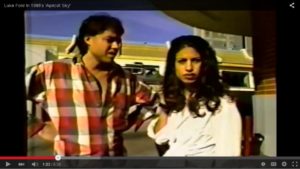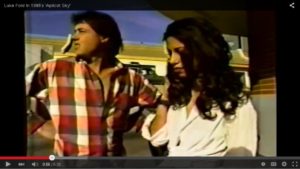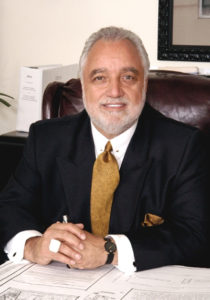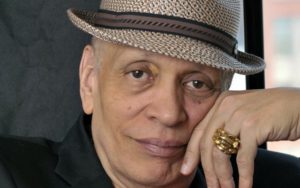It’s a hot night in Los Angeles. Around 1 a.m. Sunday, I give up trying to sleep and watch the fifth and final installment of this superb ESPN documentary series.
The show brings back memories. I moved to Los Angeles on March 24, 1994, two days before Passover. For almost three months, I stayed in the condo owned by my elderly friend Jules Zenter (the late UCLA professor and counselor) at 923 Levering Avenue, #501, in Westwood, 90024.
I spent most of the previous six years in bed afflicted with what doctors called “Chronic Fatigue Syndrome.” Through the medication Nardil, I made a partial recovery. As long as I did not exert myself, I had about two-thirds of my normal health and could largely function normally. I was registered to return to UCLA in the fall but I dreaded going back to the study regime where I had gotten so very sick in 1988 and never quite recovered. I also feared I could no longer hack it. I didn’t feel strong enough to tackle anything difficult. I needed to stay on easy street for a while.
I had several primal drives that year, perhaps none bigger than my desire to get some lovin’. Within three days of landing in LA, I was meeting women in shul and at Passover tables. I then placed a singles ad and met a Julia Roberts lookalike movie editor for a couple of passionate dates. I also hooked up with a girl from my dorm floor at UCLA 1988-89, the one I’d fantasized about for six lonely years. I was her first and it was absolutely awful.
I reunited with my UCLA girlfriend for a couple of evenings and when I didn’t have a real girl, I enjoyed Jules’s video porn collection.
During my first week in LA, Jules padded into my room one night, excited by my tales of my torrid dating life, and on his knees, asked me if I wanted a blowjob. I said no. He asked me if I was sure. I said, yes, I am sure [I don’t want a blowjob from him].
Our friendship was never the same after that. In May, he asked me to move out by June 15. He said he considered allowing me to stay with him longer but I was not a considerate roommate. I left dirty dishes in the sink and made long distance phone calls without asking permission (though I made sure to let him know afterward and to pay him promptly when his phone bill came in).
Memorial Day weekend, an heiress about five years my senior, flew in from New York and stayed with me for me for three days (that Saturday, May 28, I turned 28 and we went to the Mountaintop Minyan that morning at Stephen S. Wise temple). In August, she paid for me to fly to New York to stay with her for three weeks on Manhattan’s Upper West Side and she took me to Broadway shows and gave me spending money every day. I had virtually no money of my own (except for what I earned as a non-union extra in movies and TV).
Beginning in the fall of 1988, I became a devotee of Dennis Prager. Now in 1994, I listened to him on KABC radio every weekday and saw him at Stephen S. Wise temple most Saturday mornings. Most of my new friends in LA were people I knew in common with Dennis.
Nicole Simpson and Ron Goldman were murdered June 12 while I slept a couple of miles east in Westwood.
When I got up Monday morning, June 13, 1994, and turned on the radio, KABC was filled with reports of O.J. Simpson flying back from Chicago and police detectives wanted to interview him about the murders of his ex-wife Nicole and a waiter named Ron Goldman.
I learned from friends that Ron was Jewish.
I had no feelings about OJ. His football heyday was before I began paying attention. The news event did not seem any more important to me than any other murder except that it took place near me.
On his radio show, Dennis Prager refused to talk about OJ. He said the case had no great significance. He wouldn’t lower himself to gossip. Prager was my mentor, the things he said made sense, so I paid as little attention to the case as I could. I didn’t read articles about it. I didn’t watch news about it. I didn’t discuss it. I despised gossip. I was bigger than that.
In some ways, Dennis Prager was a good influence on me, and in other ways, he was a bad influence. In this case, he was a fool. In my fervent Pragerism of the time, I was not well served by trying to ignore reality (such as uncomfortable racial differences, which, to his credit, Prager acknowledged more than any other talkshow host I knew).
Earlier this year, I watched the ten-part FX series on OJ Simpson and was fascinated. I felt stupid for trying to ignore the case when it was going on.
My primary concern that first week of the OJ murders was where I was going to live now that I had to move out by Wednesday, June 15, 1994. I decided to take the easy way out and live out of my car. Surely something better would turn up. I was the type of guy who was doomed to rely on the kindness of strangers (aka women I was bedding). Jules said I could collect my mail from his place and come by daily to shower.
The World Cup of soccer was going on in Southern California. I was excited about rejoining life after six years on the sick bed. I loved soccer. I loved LA. I loved sliding inside woman after woman after woman. I was idolizing Dennis Prager and going to every Jewish event I could. I was applying for acting and modeling work, taking background parts for a little money, and I had an agent sending me out for auditions. I was weak and scared and broke. I loved LA. I had loved it since I discovered MTV in 1982 and saw all the pretty Southern California girls in music videos. Now I was having a good time with the girls and nothing in the world was sweeter to me than those varied connections. For an hour or two at a time, they made me feel whole.
With summer beginning June 21, my life oscillated from extremes of pleasure and excitement in the big city to feelings of genuine satisfaction from the community and substitute family I developed in the Jewish community to the desperation of my poverty and poor health and my frustration with the unnecessary turbulence I created with some people around me. Dennis Prager, as with most people I met that year, like me, but he also kept his distance. They could tell there was something unusual about me, something not quite right.
I spent my first night ever sleeping in my car Wednesday, June 15. It turned out not to be a big deal. I showered at Dr. Zentner’s place Thursday and Friday morning. Friday afternoon, as I listened to KABC radio, O.J. Simpson was dominating the news. He had not turned himself in as agreed.
I loved living in the middle of where things were happening. That made me feel important. All the TV channels were showing his white Bronco going down the freeway (from that point on, I had no doubt about his guilt) and there was a big basketball game that evening between the New York Knicks and the Houston Rockets. My primary attention was on the singles get-together that night at Mogen David synagogue on Pico Blvd.
I loved it that the Jews I knew weren’t so religious that we couldn’t talk about news and sports and anything else we wanted on the Sabbath. I was developing a relationship at the time with a UCLA nurse about five years older than me. We would last about three months, but what our thing lacked in length it made up for in intensity. It also gave me a nice place to stay that was Beverly Hills adjacent near the library. Much better than living out of my car.
When we ended in late September, I borrowed $500 to pay the mechanic and get my car out of his shop so I’d have a place to sleep. I paid her back a month later.
What I’m trying to say is that when I watch this ESPN documentary on OJ Simpson, I remember living right next door to where this was happening and I feel like I understand many of OJ’s troubles such as his sex addiction, his desire to pull himself up from nothing to get ahead and to get along and to do well in polite society and to be loved and adored and to hone your manipulative skills to get a maximum of that, to be worshiped as a god even while your body and mind are failing you, but somehow no matter how much you get what you want, your life doesn’t work, and you get flooded by blinding all-consuming jealous rages and you do stupid things. I felt those same things at that time. I too lived in the midst of plenty, got a lot, more than I ever would again, and yet the highs didn’t last as long as the lows and the fundamentals of my life didn’t build towards something holy.
Like OJ, I was a lousy actor.
Usually when I watch something, I try to imagine that that’s me on the screen and I think about how I would handle myself in that situation. Perhaps only narcissists do this?
As I ricocheted from woman to woman in my first 18 months in LA (my promiscuity ended when I decided in September of 1995 to write a book on the porn industry, I think the subject drove me to be more religious and conservative in my private life to maintain my sanity), I maintained certain basic ethical standards such as no cheating, no married women, no drugs, no unsafe sex, no getting anyone pregnant, no lying and deception. Despite my morals, I felt myself being pulled into a quicksand around sex. I despaired that I would ever be able to say no to a sexual exchange with a pretty woman even if it violated everything I held sacred.
When I did intimate things with a woman, I quickly developed intimate feelings, and I viscerally understood why people kill over this stuff. By sleeping around, I was playing with fire. When I thought a woman belonged to me and then she got with another guy, I felt sick to my stomach. When women teased me but didn’t please me, I felt rage.
I’ve never hit a woman, never gotten close, I can’t even spank them the way some of them want to be spanked. But even a beta male like me can feel things like jealousy and rage and try to sublimate through promiscuity.
Because of my illness, I didn’t leave home until the summer of 1993 and it was only in the beginning of 1994 that I regained enough strength to lead two-thirds of a normal life.
When the largely black jury acquitted OJ of murder on October 3, 1995, I realized that blacks and whites saw the world very differently. I realized that blacks would side with blacks even when they murdered people. I didn’t want to think this way. Influenced by Dennis Prager, I wanted to divide the world between the moral and the immoral, not between black and white. I wanted values to be most important, not skin color. With the OJ verdict, however, reality splintered my prefered worldview.
In the fall of 1995, I began borrowing computers from friends, and I started writing my book. My life as I know it today, however, didn’t begin until I bought myself a proper PC for about a $1000 on July 3, 1997, and connected to the internet and began to blog within an hour of getting home.
The original score for this ESPN documentary is gorgeous. It embodies why I want to live in LA. I don’t know how to write musical criticism, but when I listen to this theme, when I hear it soar, it makes me feel that LA is the place for me, that it’s the place where I will get to feel what I want to feel. This is the city where I will become a hero.
I am rewatching the series. It begins with OJ saying that growing up, the thing he wanted most was fame. Ditto.
He talks about his humiliating work in jail as a porter and janitor. Boy, do I identify with that. I have lived my life dreaming about grandeur while in reality I swallowed constant humiliation.
When I put myself in his shoes, I feel bad for him. There is nothing that is human that is foreign to me. Is it wrong for a person to feel empathy with a murderer? No. Feelings can never be wrong. You’re not a bad person for having feelings. You’re only a bad person if you do bad things that outweigh the good you do.
So what if this documentary was about Hitler? I watched Downfall (2004) about Hitler’s last days and I felt empathy for Hitler. Watching that movie, I felt like I understood him a little bit.
I don’t think anybody views themselves as a bad person.
From the perspective of the universe, there are no good guys and bad guys. There are just forms of life struggling for survival. Only when we see things through the lens of faith are we able to distinguish good from evil. I have faith and I have belief in God and in objective good and evil, but sometimes I like to step away from that and just look at life as war without any good guys and bad guys. I think this is called realism. In real life, the good guys don’t win more than the bad guys. In real life, who’s good and bad depends upon your perspective.
There are thousands of stories of charming black men who turn out to be murderers. The Australian one is called The Chant of Jimmy Blacksmith. Only whites who want to believe that race is not real are surprised.
What do you think Father’s Day is like on an aboriginal reservation? Do you think it’s a big holiday in Africa?
Do I lack a life? I’m now watching the OJ Simpson documentary for the second time. I wish someone could explain the theme music to me. It feels like something out LA noire. It makes my heart ache with love for this city.
The documentary features a lot of professional blacks, including ones so pale that they could pass for white, such as Danny Bakewell and Walter Mosley (who also identifies as Jewish).
Like Barack Obama, these guys identify as “black” because it gives them an advantage.
According to the doco, the population of blacks in Los Angeles went up 600% between 1940 and 1960 while other groups merely went up 100%.
Mosley: “The hope is that all the troubles I’ve known will be gone. I will no longer be held down by this notion held against my skin and my hair.”
What notion? That race is real? That blacks on their own are incapable of first world civilization? That blacks everywhere in the world have crime rates many times higher than that of whites and East Asians? How many people would like to ride a 100-story elevator exclusively designed and built by dark-skinned blacks? That’s as ridiculous as expecting a white guy to start at cornerback in the NFL.
Bernard Parks, the former black chief of the LAPD, notes that Chief Parker transformed the LAPD into non-corrupt agency.
Parks: “Everything in the police academy and command structure was white.”
Gee, I wonder if that had anything to do with the LAPD’s efficiency? As the LAPD has become more diverse, it has become more corrupt. The more affirmative action it institutes, the more corrupt and incompetent the cops.
When there’s corruption and brutality in the LAPD these days, smart observers immediately suspect the affirmative action latino officers.
The more diverse an institution, the weaker and more divided it is likely to be. A homogenous white or East Asian police force is much more likely to be honest and upstanding than a force with lots of affirmative action hires.
OJ’s USC teammate Fred Khasigian: “USC controls TV, Hollywood, banking, finance, law, medicine, in Los Angeles. The alumni are very powerful and their whole existence revolves around the success of the football team.”
Dumb goy. It’s not USC that controls “TV, Hollywood, banking, finance, law, medicine.”




